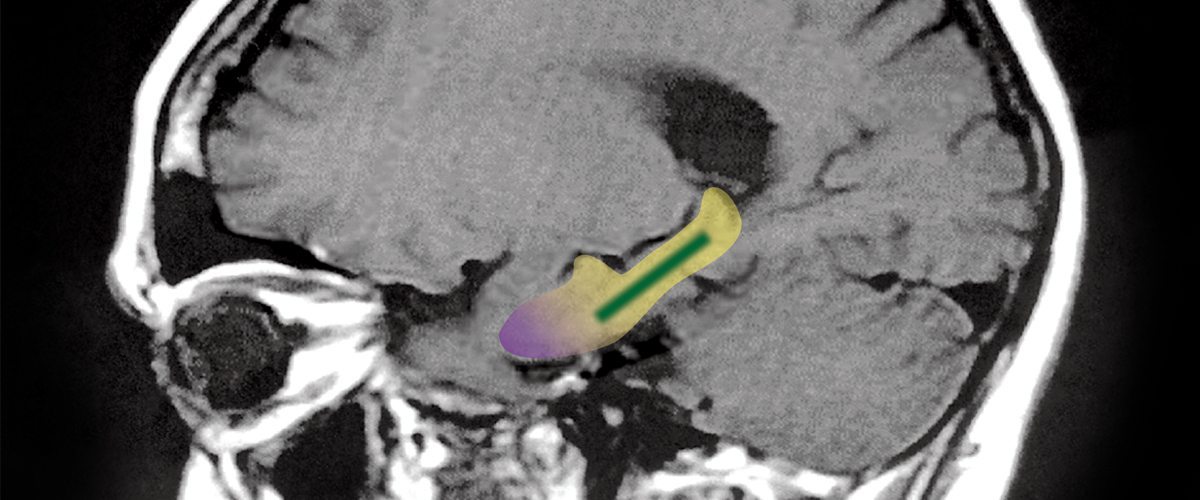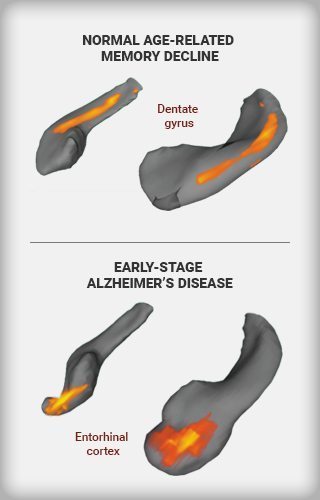Studying Alzheimer’s Disease: From Anatomy to Molecular Understanding
The Alzheimer’s Disease Research Center at Columbia University Irving Medical Center focuses on early detection.


How do we differentiate between normal cognitive aging and diseases that affect the brain?
Such is the charge of Dr. Scott A. Small, director of the Alzheimer’s Disease Research Center at Columbia University Irving Medical Center and the Boris and Rose Katz Professor of Neurology. Through the use of cutting-edge neuroimaging technology, Dr. Small is working to identify the causes of Alzheimer’s and determine precisely how the disease affects the brain. His primary target? The hippocampus, a memory structure that often experiences shrinkage in a patient with Alzheimer’s disease.
“For a while, there was a debate about whether Alzheimer’s and aging are one in the same,” says Dr. Small. “Through a decade of work, we were able to dissociate regions of the hippocampus that were most linked to aging versus those that were most linked to Alzheimer’s.”
Using a method known as high-resolution functional magnetic resonance imaging (fMRI), Dr. Small and his fellow researchers learned critical information about the structure of the hippocampus. Within the hippocampus, there are several regions and a circuit of nodes. Both aging and early-stage Alzheimer’s can impact the circuit of nodes, which initially made it difficult for scientists to distinguish between the two.
By comparing the fMRI scans of mice and humans, Dr. Small’s team has come to better understand how the hippocampus functions during normal associative memory, as well as how it fails during aging and during Alzheimer’s. The team determined that there are regions of the hippocampus that are more likely to be linked with either age-related memory loss or early Alzheimer’s, respectively.
With this in mind, Dr. Small and his team are trying to better understand the molecular mechanisms behind both age-related memory loss, together with Dr. Eric Kandel, and in Alzheimer’s, together with Dr. Richard Mayeux.
“More and more of our patients are simply healthy elders who say, ‘I’ve noticed some memory loss. Is it early Alzheimer’s or normal aging?’” Dr. Small says.

Changes in a specific part of the brain’s hippocampus—the dentate gyrus—are associated with normal age-related memory decline in humans and other mammals.
Lab of Scott Small, MD/Columbia University Irving Medical Center
He and researchers like him are hoping that MRI technology will help them detect Alzheimer’s before mental decline or irreversible brain damage occurs. To do this, Dr. Small and his team are trying to understand the mechanisms behind Alzheimer’s and age-related memory loss so that they can develop effective treatments for each.
“The most important part is trying to get at underlying causes,” he says. “Once we identify the driving causes, we can begin to develop clues for therapeutic intervention.”
Dr. Small is leading a clinical trial that tests a natural product called cocoa flavonol that may be effective against age-related memory loss. Dr. Small’s team has published work on novel compounds that drug companies are trying to develop into new treatments.
“The ultimate goal is therapeutic intervention,” Dr. Small says, “but we have to first extract enough information to come up with novel therapeutic strategies.”
While Dr. Small says that it’s hard to determine when new, highly effective drugs against Alzheimer’s will come to light, he is cautiously optimistic that the science is heading in the right direction.
“Through advances in early detection to advances in [understanding] mechanisms, and advances in drug discovery, we’re clearly in the right playing field. Therefore, I have no doubt that a home run will be hit. Whether it’ll be a year, five, 10 years is hard to know, but I do think the next five years is a reasonable timeline.”
Learn more about how we diagnose Alzheimer’s disease.

